The sound of gata being squeezed from freshly grated coconut and the aroma of ginisang bawang at luya (sautéed garlic and ginger) always meant Nanay was making her special Ginataang Manok. It's one of those dishes that turns an ordinary weekday into something special – when the rich, creamy sauce meets steaming white rice, all the worries of a long day just melt away.
Whether it was served during afternoon merienda on rainy days or as a Sunday family lunch after church, this ginataan never fails to bring the family to the table, with everyone trying to claim the last piece of chicken and sauce-soaked potato.
Best of all, it's a practical dish that stretches a single chicken to feed the whole family, proving that some of the most comforting meals don't need fancy ingredients – just lots of love, gata, and a handful of spices from your trusted sari-sari store.
Jump to:
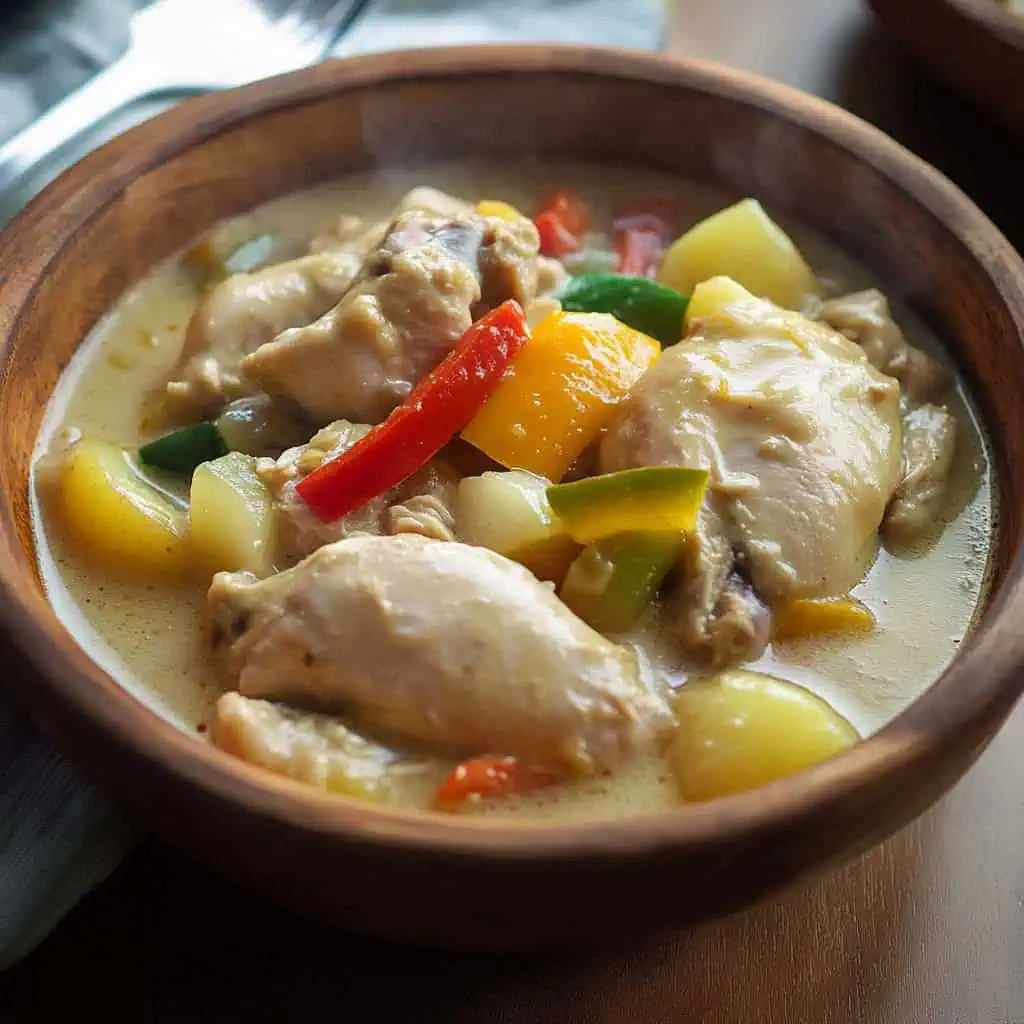
Why You'll Love This Recipe
- Rich and Creamy: The combination of fresh coconut milk and tender chicken creates an irresistible sauce
- Perfectly Balanced: Spicy, creamy, and savory flavors in every bite
- One-Pot Wonder: Easy cleanup with everything cooked in a single pan
- Budget-Friendly: Uses simple ingredients available in any Filipino market
- Versatile: Can be adjusted to your preferred spice level
- Family-Sized: Perfect for family gatherings or weekly meal prep
Ingredients
The combination of coconut milk, chicken, ginger, garlic, and chilies forms the foundation of this dish's distinctive flavor profile. Coconut milk provides a creamy base that tenderizes the chicken while cooking, potatoes add heartiness and absorb the flavorful sauce, and the balance of aromatics (ginger, garlic, onion) with spicy chilies creates the perfect depth of flavor that makes this dish uniquely Filipino.

- 1 whole chicken (3-4 lbs), cut into serving pieces
- 2 medium potatoes, peeled and quartered
- 1 large onion, thinly sliced
- 4 cloves garlic, minced
- 2-inch ginger, julienned
- 2 cans (13.5 oz each) coconut milk
- ½ cup water
- 4 Thai chili peppers, chopped
- 1 red bell pepper, sliced
- 1 green bell pepper, sliced
- 3 tablespoons fish sauce
- ¼ cup cooking oil
- Salt, to taste
Equipment
- Large, deep pan or Dutch oven: Essential for properly simmering the coconut milk without overcrowding the chicken pieces.
- Sharp knife: For cutting chicken into uniform pieces to ensure even cooking.
- Cutting board: Preferably separate ones for meat and vegetables to prevent cross-contamination.
- Wooden spoon: The best tool for stirring coconut milk dishes as it won't conduct heat and helps prevent curdling.
- Measuring cups and spoons: For precise ingredient measurements.
- Plate or bowl: For setting aside browned potatoes.
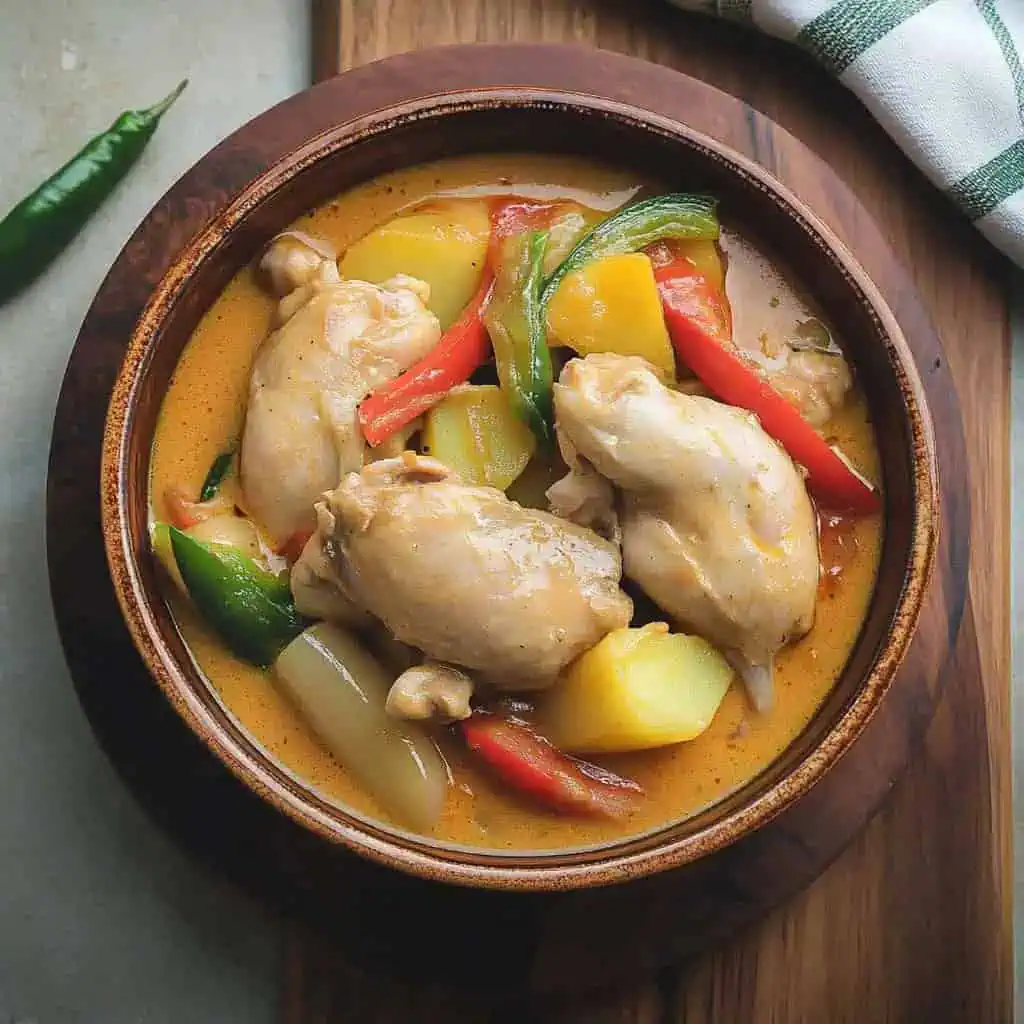
How To Make
- Heat your cooking oil in a large, deep pan over medium-high heat. While the oil is heating, prepare your chicken pieces and ensure all vegetables are cut and ready.
- Place the quartered potatoes in the hot oil and brown them until they develop a golden color on all sides, about 5 minutes. Remove the potatoes and set them aside on a plate.
- Lower the heat to medium. In the same pan, add your thinly sliced onions, minced garlic, and julienned ginger. Sauté these aromatics until they become fragrant and the onions turn translucent, about 2-3 minutes.
- Add your chicken pieces to the pan with the aromatics. Allow the chicken to brown properly for 5-7 minutes, turning occasionally to ensure even cooking. Pour in the fish sauce and cook for another minute to let the flavors meld.
- Pour in both cans of coconut milk along with the half cup of water. Add your Thai chili peppers. Bring this mixture to a very gentle simmer over low heat. The coconut milk should never boil vigorously as this will cause it to separate or curdle.
- Cover the pan and let everything cook together for 20-25 minutes. The sauce should be gently bubbling, and you'll notice it starting to thicken.
- Return your browned potatoes to the pan and add both the red and green bell peppers. Continue cooking for 5 more minutes or until the potatoes are fork-tender and the peppers are slightly softened but still crisp.
- Make your final taste adjustments by adding salt according to your preference. Once seasoned, remove the pan from heat and let it rest for 10 minutes before serving.
- Serve your Ginataang Manok hot over freshly steamed rice.

Tips from Lola's Kitchen
- Use bone-in chicken pieces for more flavor—the bones enrich the sauce while cooking.
- Brown the chicken properly before adding coconut milk to develop a deeper flavor base.
- Keep heat low when simmering coconut milk to prevent curdling.
- Look for orange oil droplets on the surface—this indicates perfectly cooked coconut milk.
- Let the dish rest for 10 minutes before serving to allow flavors to develop further.
- Native chicken (free-range) provides the most authentic flavor if available.
Substitutions
- Chicken: Boneless thighs or wings work well if you prefer specific cuts.
- Coconut milk: Coconut cream diluted with water can be used in a pinch.
- Thai chilies: Substitute with finger chilies or any bird's eye chilies based on your spice preference.
- Vegetables: Bell peppers can be replaced with eggplant, young papaya, chayote, squash, or string beans.
- Fish sauce: Soy sauce with a pinch of salt can work as an alternative, though the flavor profile will change slightly.
Troubleshooting
- Sauce too thin? Simmer uncovered until reduced, or mix 1 teaspoon cornstarch with water and add to thicken.
- Sauce curdling? Lower heat immediately, add room temperature coconut milk, and stir continuously until smooth.
- Chicken not tender? Extend cooking time by 10-15 minutes and ensure pieces are uniform in size.
- Too spicy? Add more coconut milk or a teaspoon of sugar to balance the heat.
- Not spicy enough? Add more fresh chilies or a dash of chili sauce to the finished dish.
Storage & Reheating
- Refrigerator: Keeps well for 3-4 days in an airtight container.
- Not recommended for freezing: Coconut milk may separate when thawed.
- Stovetop reheating (preferred): Use low heat, add a splash of coconut milk or water, and stir occasionally until heated through.
- Microwave reheating: Use 50% power in 1-minute intervals, stirring between intervals to ensure even heating.
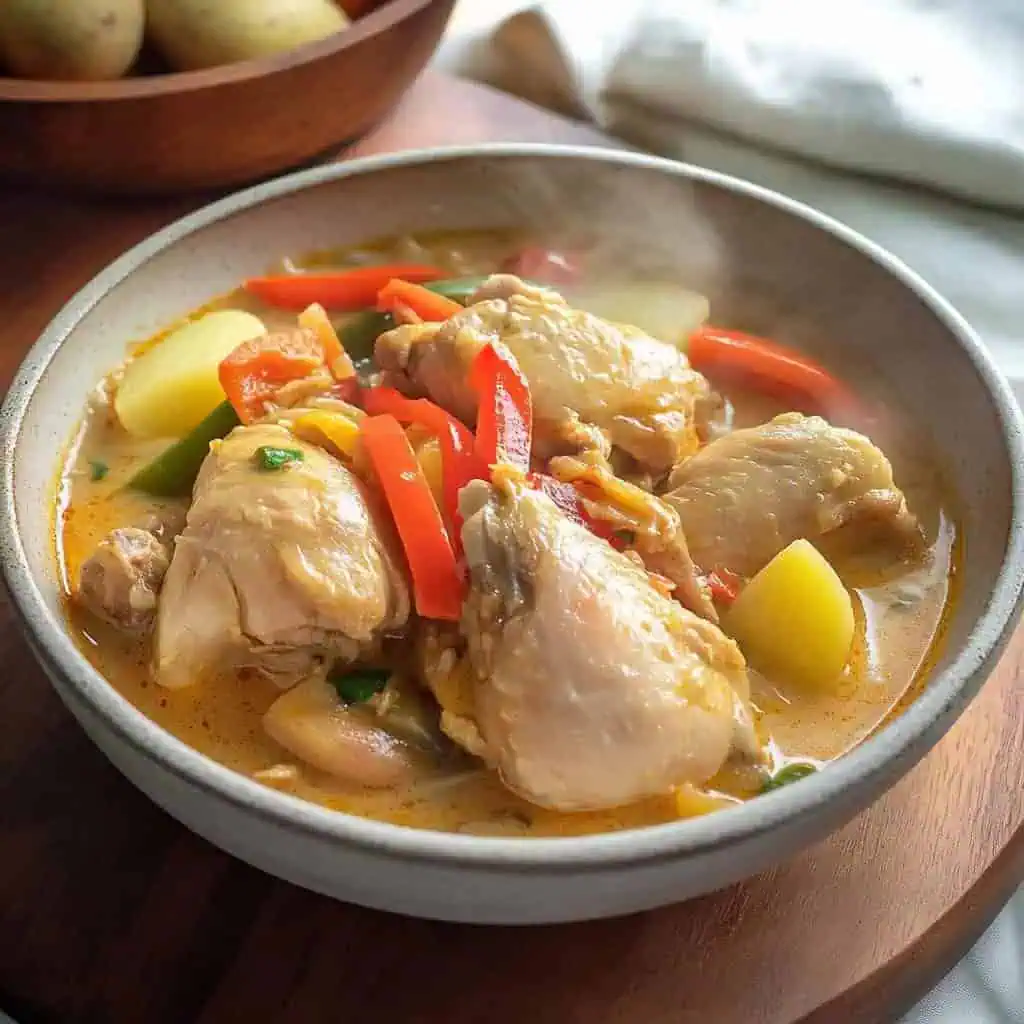
FAQ
Can I use light coconut milk?
Traditional recipes use full-fat coconut milk for richness. Light coconut milk will result in a thinner sauce and less authentic flavor.
How spicy is this dish?
Medium spicy with 4 Thai chilies. You can adjust the amount to suit your taste preferences.
Why did my coconut milk curdle?
High heat causes curdling. Always keep at a gentle simmer and stir occasionally.
Can I make this in advance?
Yes, the flavors actually improve overnight. Just reheat gently to prevent sauce separation.
Is this dish gluten-free?
Yes, it's naturally gluten-free, but always check your fish sauce label to confirm.
Can I add other vegetables?
Absolutely! This dish is very adaptable. Try adding moringa leaves (malunggay) in the last 2 minutes of cooking.
How do I know when the chicken is done?
The meat should easily pull away from the bone and register 165°F (74°C) on a meat thermometer.
What's the best rice to serve with this?
Jasmine rice is traditional, but any white rice works well.
Related
Looking for other recipes like this? Try these:

Ginataang Manok (Filipino Chicken in Spicy Coconut Milk)
Ingredients
- 1 whole chicken 3-4 lbs, cut into serving pieces (manok)
- 2 medium potatoes patatas, peeled and quartered
- 1 large onion sibuyas, thinly sliced
- 4 cloves garlic bawang, minced
- 2- inch ginger luya, julienned
- 2 cans 13.5 oz each coconut milk (gata)
- ½ cup water tubig
- 4 Thai chili peppers siling labuyo, chopped
- 1 red bell pepper pulang bell pepper, sliced
- 1 green bell pepper berdeng bell pepper, sliced
- 3 tablespoons fish sauce patis
- ¼ cup cooking oil mantika
- Salt asin at paminta, to taste
Instructions
- Start by heating your cooking oil (mantika) in a large, deep pan over medium-high heat (180°C/350°F). While the oil is heating, prepare your chicken pieces and ensure all vegetables are cut and ready.
- Place the quartered potatoes (patatas) in the hot oil and brown them until they develop a golden color on all sides, about 5 minutes. Remove the potatoes and set them aside on a plate (itabi muna ang patatas).
- Lower the heat to medium (160°C/320°F). In the same pan, add your thinly sliced onions (sibuyas), minced garlic (bawang), and julienned ginger (luya). This combination is called gulay na pampalasa in Tagalog. Sauté these aromatics until they become fragrant and the onions turn translucent (hanggang maging malambot ang sibuyas), about 2-3 minutes.
- Add your chicken pieces (manok) to the pan with the aromatics. Allow the chicken to brown properly for 5-7 minutes, turning occasionally to ensure even cooking. Pour in the fish sauce (patis) and cook for another minute to let the flavors meld.
- Now comes the crucial step of adding your coconut milk (gata). Pour in both cans of coconut milk along with the half cup of water (tubig). Add your Thai chili peppers (siling labuyo). Bring this mixture to a very gentle simmer over low heat (140°C/285°F). Remember, hindi dapat kumulo nang malakas - the coconut milk should never boil vigorously as this will cause it to separate or curdle (mawawala ang gata).
- Cover the pan and let everything cook together for 20-25 minutes. The sauce should be gently bubbling, and you'll notice it starting to thicken. This slow cooking ensures the chicken becomes tender (malambot) and the coconut milk reduces to the right consistency (tamang lapot).
- Return your browned potatoes to the pan and add both the red and green bell peppers (paminta). Continue cooking for 5 more minutes or until the potatoes are fork-tender (madaling matusok ng tinidor) and the peppers are slightly softened but still crisp.
- Make your final taste adjustments by adding salt (asin) and pepper (paminta) according to your preference (ayon sa panlasa). Once seasoned, remove the pan from heat and let it rest for 10 minutes before serving. This resting period allows the flavors to settle and develop (para lalong sumarap).
- For the best experience, serve your Ginataang Manok hot over freshly steamed rice (mainit na kanin). The dish should have a creamy, slightly thick sauce with tender chicken that easily comes off the bone. You should see small orange droplets of oil on the surface - this is a sign of perfectly cooked gata.
- If your sauce becomes too thick while resting, you can thin it out with a small amount of hot water (mainit na tubig). If it's too thin, simmer uncovered for a few more minutes until it reaches your desired consistency (hanggang sa lapot na gusto mo).
- Remember to store any leftovers in an airtight container in the refrigerator (ref). When reheating, do so gently over low heat (140°C/285°F), adding a splash of coconut milk if needed to restore the creamy consistency.
Tips from Lola's Kitchen
- Use native chicken (free-range) for the most authentic flavor
- Don't rush the browning process - it builds essential flavor
- Keep coconut milk at a gentle simmer to prevent curdling
- Add coconut cream (kakang gata) at the end for extra richness
- Let the dish rest for 10 minutes before serving to allow flavors to meld
Nutrition
The Story Behind Ginataang Manok (Filipino Chicken in Spicy Coconut Milk)
Ginataang Manok, a cherished Filipino chicken stew simmered in coconut milk, tells the story of the Philippines' deep connection with coconuts and the ingenuity of Filipino home cooking. This beloved dish, known in different regions as "Manok sa Gata" or "Chicken Ginataan," emerged from the coastal regions where coconut trees abundantly grow, particularly in Southern Luzon, Bicol, and Visayas.
In traditional Filipino households, the preparation of Ginataang Manok begins with the morning ritual of grating fresh coconuts. Skilled hands would squeeze the coconut milk (gata) through cheesecloth, separating the first press (kakang gata) from the second press (pangalawang gata). This technique, passed down through generations, creates the signature rich and layered coconut flavor that makes this dish distinctively Filipino.
The addition of ginger (luya) and chilies (siling labuyo) in Ginataang Manok reflects the Filipino adaptation of Indian and Malay culinary influences, dating back to pre-colonial trading times. The Bicolano version, known for its fiery heat, demonstrates how different regions adapted the recipe to local tastes, with some areas adding turmeric (luyang dilaw) for color and medicinal benefits.
What makes Ginataang Manok truly special is its role in Filipino family life. During monsoon season, when rain beats against nipa roofs, this warming dish brings comfort to Filipino homes. It's a fixture at family gatherings, where multiple generations share stories over steaming plates of rice soaked in creamy coconut sauce. The dish exemplifies "lutong bahay" (home cooking) at its finest – economical yet satisfying, simple yet flavorful.
Today, modern Filipino cooks might use canned coconut milk for convenience, but the soul of Ginataang Manok remains unchanged. Whether prepared in a humble provincial kitchen or a modern city apartment, the dish continues to embody the Filipino value of "pagmamahal sa pagkain" – love expressed through food. The balance of creamy coconut milk, tender chicken, and spices creates a symphony of flavors that has stood the test of time.
In many Filipino-American households, Ginataang Manok serves as a crucial link to cultural heritage. Second and third-generation Filipinos often learn to cook this dish as their first foray into Filipino cuisine, making it a vital thread in the fabric of cultural preservation. Its straightforward preparation method, combined with readily available ingredients in Asian markets, makes it an accessible entry point into Filipino cooking.
The versatility of Ginataang Manok also showcases Filipino resourcefulness. While chicken is traditional, variations exist using different proteins or additional vegetables like papaya, moringa leaves (malunggay), or bamboo shoots (labong), depending on seasonal availability. Each family's recipe tells its own story, with subtle variations in spice levels, consistency, and choice of vegetables reflecting regional origins and family preferences.
From its humble beginnings as a practical way to cook chicken using abundant local ingredients, Ginataang Manok has evolved into a symbol of Filipino culinary heritage. It represents the perfect marriage of native cooking techniques with influences from centuries of cultural exchange, resulting in a dish that's both simple and sophisticated, humble yet celebratory – truly Filipino in every way.
Remember: Perfect ginataang manok isn't just about the coconut milk—it's about achieving that ideal consistency where the sauce is creamy but not too thick, the chicken is tender enough to fall off the bone, and the heat from the chilies builds gradually with each spoonful.
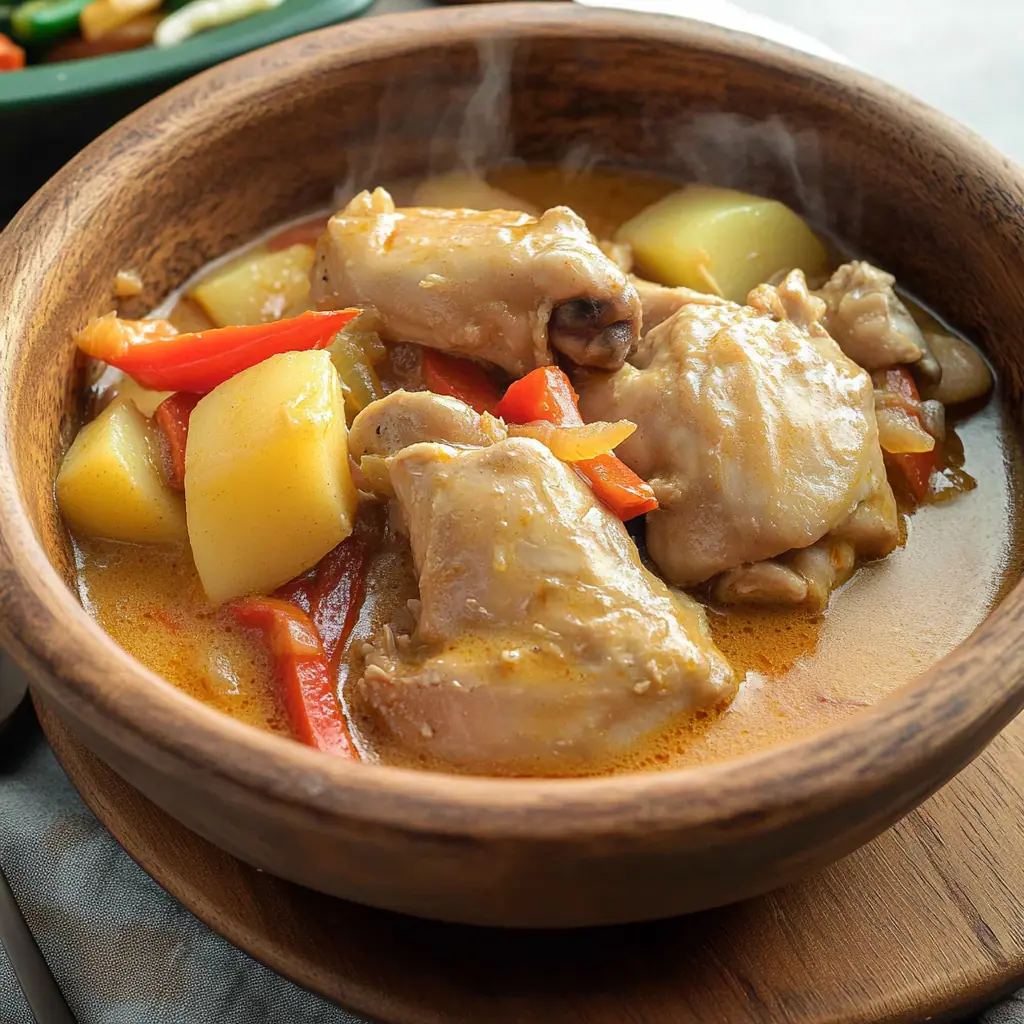

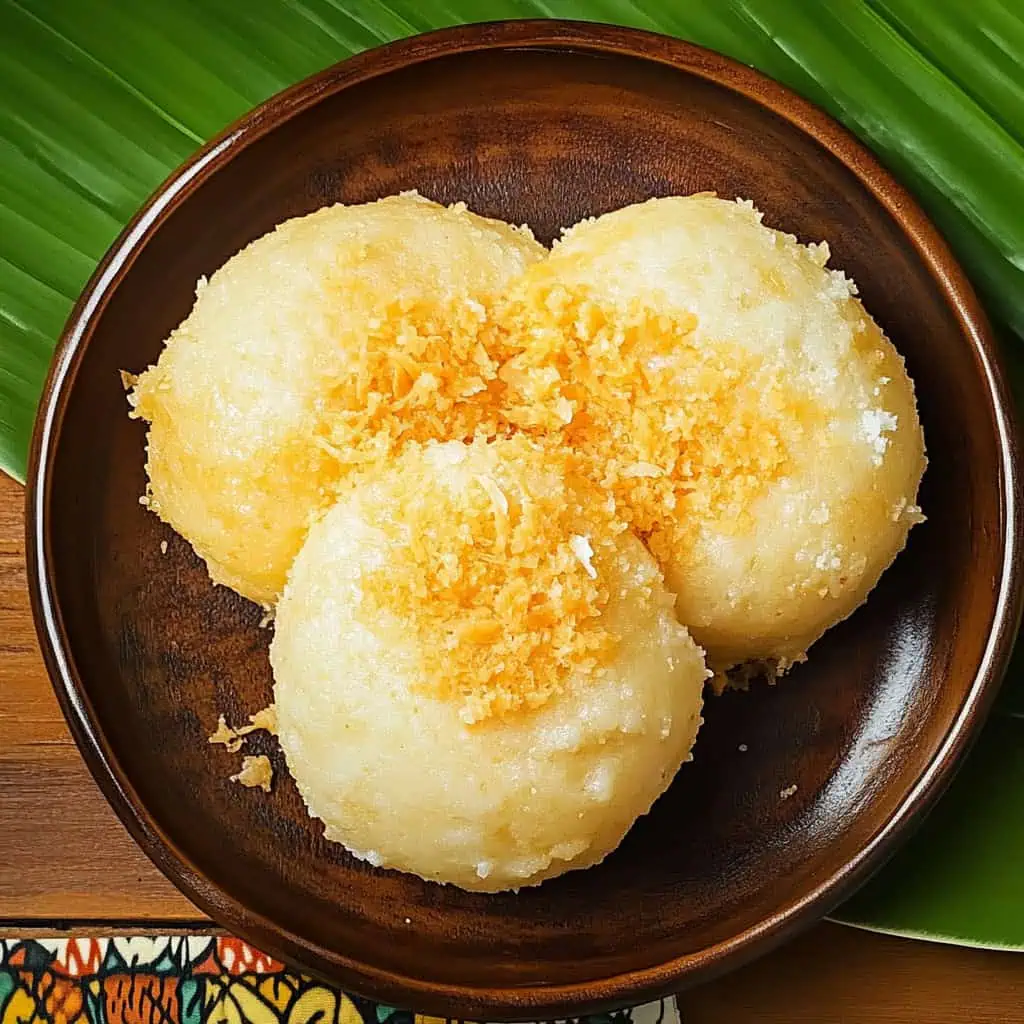
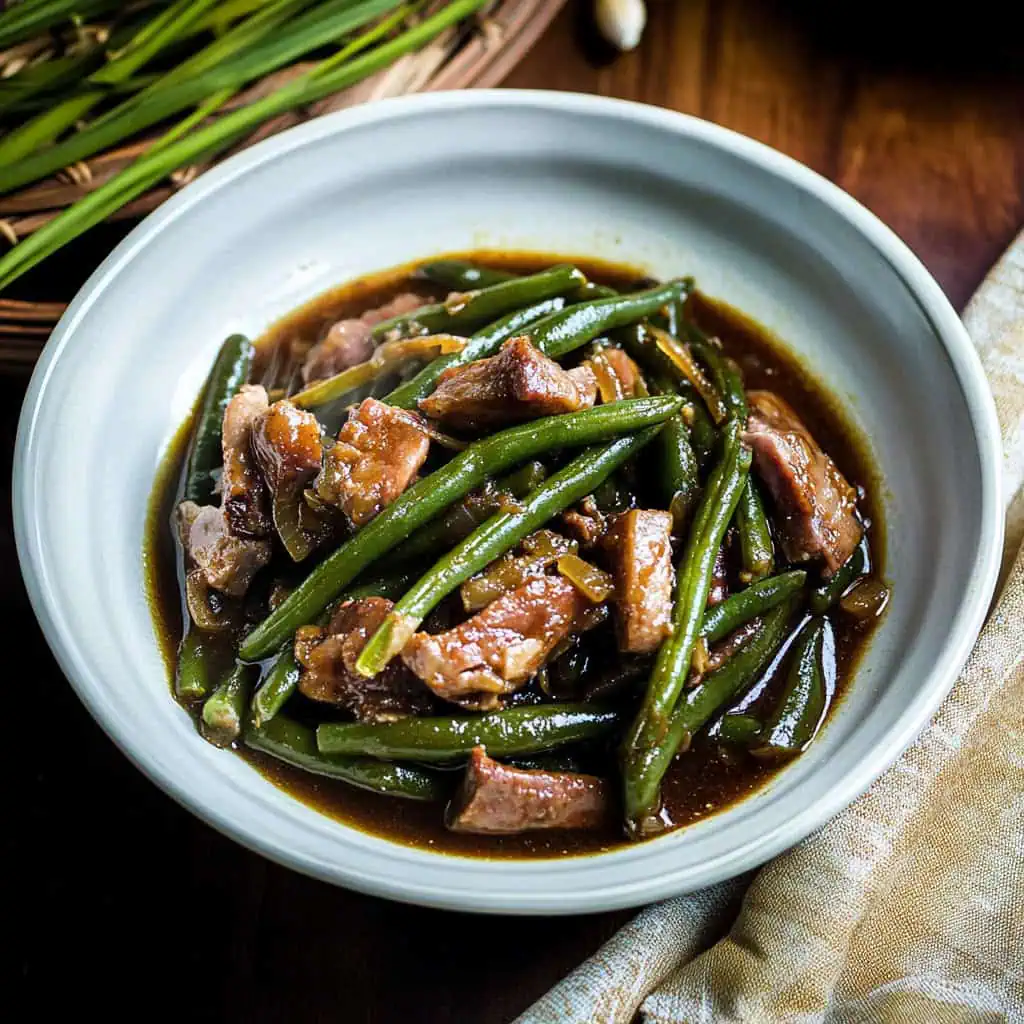
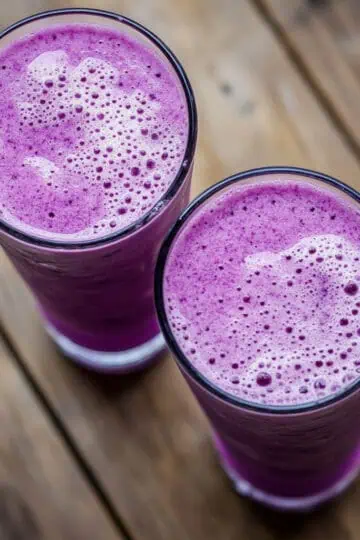
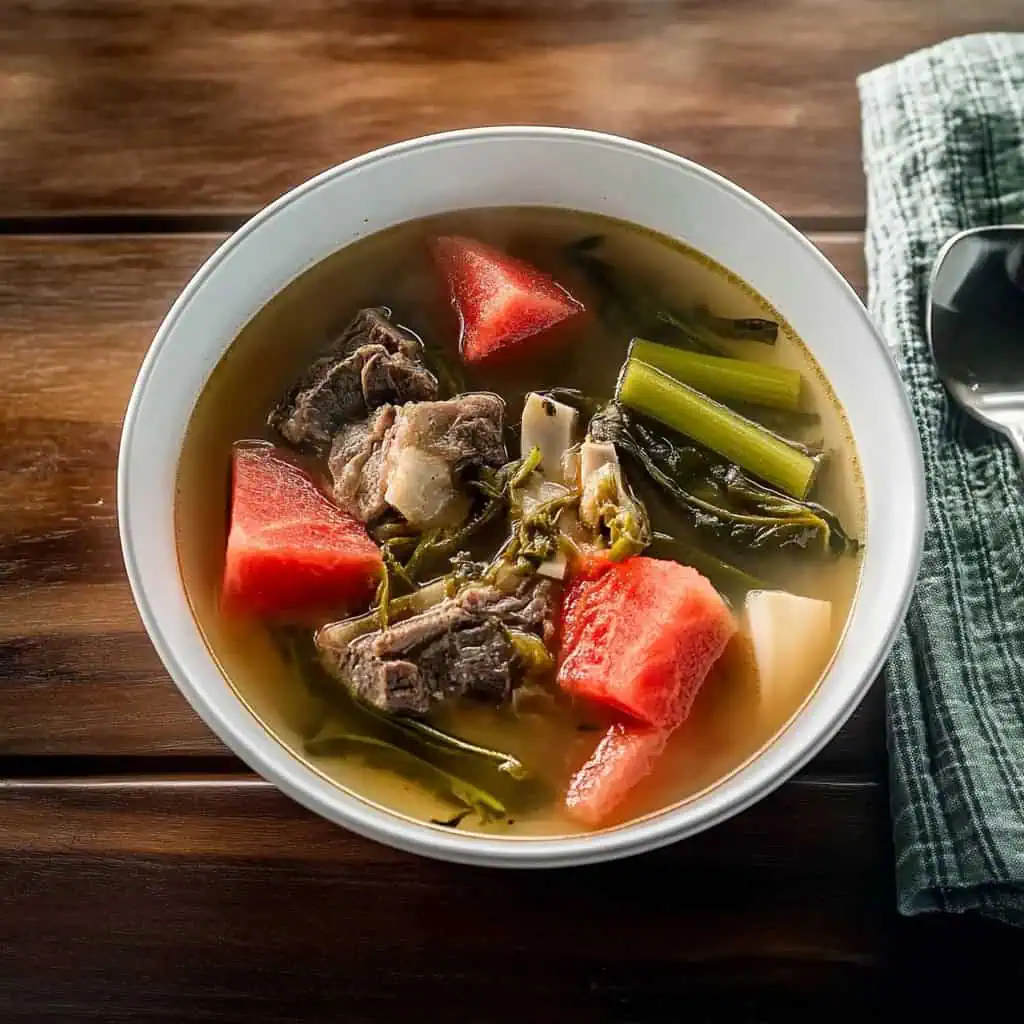
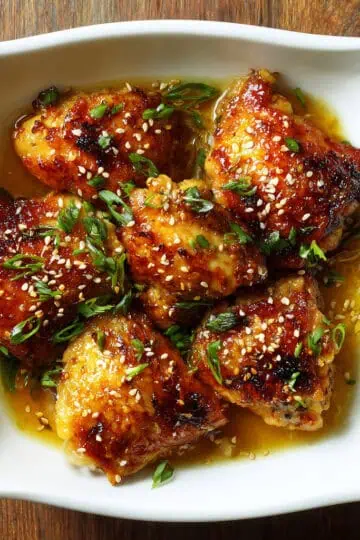
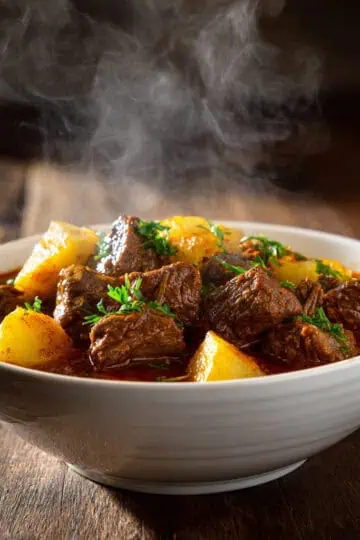
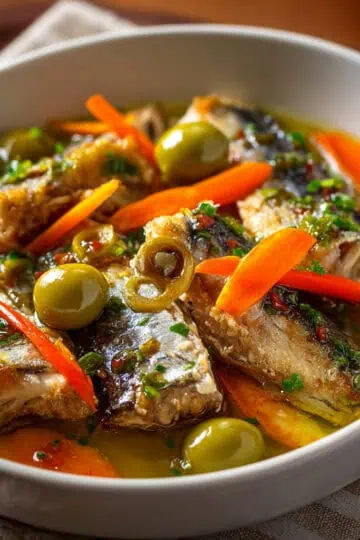
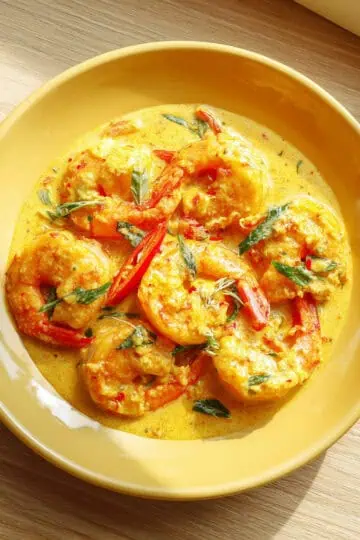
Comments
No Comments